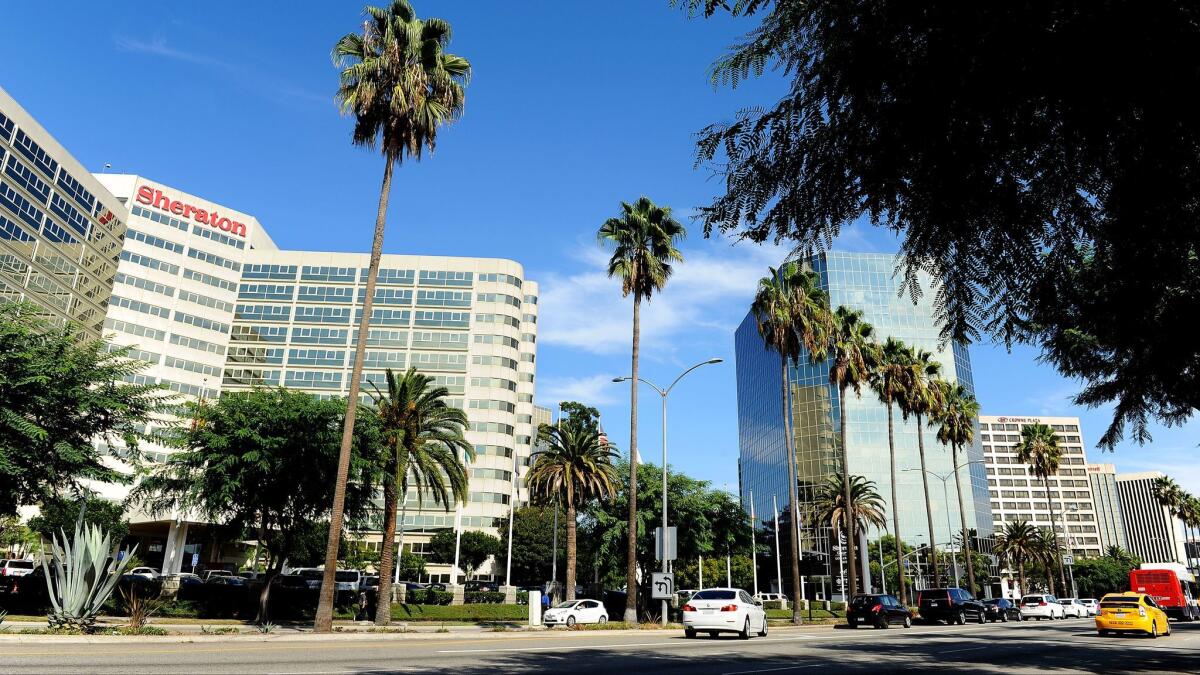Mergers create hotel giants, but few are complaining

On Century Boulevard near Los Angeles International Airport, travelers can pick among 14 hotels, ranging from budget lodging to a stylish three-diamond inn.
In reality, the choices are more limited.
All the hotels clustered on the busy thoroughfare are owned, managed or licensed by just six companies, led by Marriott International Inc., the world’s largest hotel company after its recent $13-billion takeover of Starwood Hotels & Resorts Worldwide Inc.
Nationwide, nearly half of the 53,400 hotels are linked to the six hotel giants — Marriott, Hilton Worldwide, Intercontinental, Wyndham Worldwide, Choice Hotels and Best Western Hotels & Resorts.
Despite a few murmurs of concern in the corporate travel world, Marriott swallowed Starwood with no opposition from antitrust watchdogs around the world. And the dominance of a handful of hotel companies hasn’t sparked the kind of protest seen in the airline, telecom, bank and insurance industries.
“It hasn’t been a top concern until now,” said Diana Moss, president of the American Antitrust Institute, a Washington, D.C., nonprofit think tank that focuses on competition and consumer choice.
The institute, which has opposed several airline mergers on antitrust grounds, is looking more closely at the increasing merger activity in the hotel industry.
“Hotels tend to fly under the radar,” Moss said. “They don’t get a lot of attention.”
The merger of Marriott and Starwood — creating a hotel behemoth with 5,800 hotels in more than 100 countries — was just the latest hotel deal to concentrate the industry in the last few years.
In 2015 alone, France’s AccorHotels bought the Toronto-based parent company of the luxury Fairmont, Raffles and Swissotel brands for $2.7 billion; Intercontinental Hotels Group acquired Kimpton Hotels and Restaurants for $430 million; Marriott acquired Delta Hotels & Resorts for $135 million; and a Wyndham Worldwide subsidiary acquired Dolce Hotels & Resorts for $57 million.
Before the Marriott and Starwood deal, the series of acquisitions did little to reduce competition in the hotel industry, but the latest transaction might be “a game changer,” according a report by CWT Solutions Group, a consultant to the travel industry.
“With daily room rates and occupancy levels at all-time highs in many major markets, basic economics dictate that less competition will only lead to even higher prices,” the report said.
In Los Angeles, Marriott and Starwood account for nearly half of corporate travel spending, among the highest percentages in major market where those companies operate, CWT said.
Marriott spokeswoman Felicia McLemore rejected suggestions that the company’s greater girth cuts into the choices available to travelers.
“The lodging industry continues to be very fragmented compared to other travel-related businesses, such as airlines, with robust competition from numerous lodging brand companies and independent operators,” she said.
Some hotel analysts predict little fallout from the increasing clout of the top six hotel companies.
Among the reasons: A big share of those brand hotels are simply licensed to carry a franchise name but are owned or managed by local hoteliers, who can set the nightly rates based on local demands.
Also, most major hotel giants oversee a range of brands, from cut-rate to high-end, giving consumers more options.
“The industry is very segmented,” said Andrew Coggins, a management professor at New York’s Pace University. “If you look at any big hotel company, they manage different brands. The brands appeal to different segments of the market.”
For example, the New Yorker, a Wyndham hotel in Manhattan, offers rooms for more than $400 a night. Meanwhile, the Travelodge in Jersey City, N.J. — another Wyndham hotel — rents rooms for as little as $70 a night.
“There are checks and balances within the system,” said Bruce Baltin, a hospitality consultant with PKF Consulting.
Short-term rental businesses such as Airbnb, HomeAway and VBRO are also adding competition, particularly in big cities and tourist areas, to keep hotel giants from abusing their dominance by imposing exorbitant rates.
“Airbnb hosts keep 97% of what they charge for their listing and make travel more affordable for the middle class,” Airbnb spokesman Nick Papas said.
Business travelers who have spent many nights each year in hotels say they don’t notice the dominance of a handful of hotel companies when they travel.
Rancho Palos Verdes resident Kerry Welsh, a venture capitalist and inventor, has racked up millions of airline miles and stayed in countless hotels. Welsh said he thinks that the Internet has made it easier for travelers to compare hotel rates, making it harder for big hotel chains to take advantage of any dominance.
“I stay in hotels a lot and I’m not as concerned about who owns them, rather that they have the right amenities,” he said.
Neal Nakagiri, president of a securities brokerage firm in Burbank, said a big advantage of staying at big chain hotels is being able to collect loyalty points to earn discounts or free hotel stays.
Nakagiri said he and his family stayed in at a luxury hotel in Barcelona in May and a resort in Hawaii in October.
“In both cases we used our Starwood points instead of cash,” he said.
To read more about the travel and tourism industries, follow @hugomartin on Twitter.
More to Read
Inside the business of entertainment
The Wide Shot brings you news, analysis and insights on everything from streaming wars to production — and what it all means for the future.
You may occasionally receive promotional content from the Los Angeles Times.











